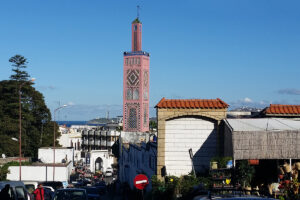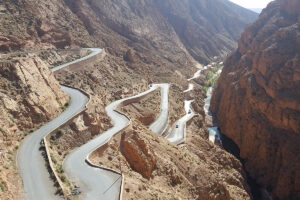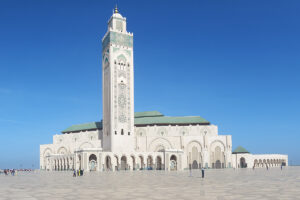After working in aerospace satellite engineering for more than 20 years, Kyle and Angela Roesler were ready for a change. “We wanted a job where we can travel the world, see different places and meet interesting people,” said Kyle.
From the SDSU website, the Roeslers learned about the American Language Institute’s 130-hour TESL/TEFL certificate program, which they completed in just four weeks by choosing the intensive daytime program. (There’s also the option of 11 weeks of nighttime courses.) Two months later, the Roeslers were teaching English in Casablanca. Talk about taking action on a dream.
Kyle Roesler answered a few questions about their experience abroad.
How did the program’s free worldwide job placement assistance work?
We received lots of interesting options from Jason [Greeno, ALI assistant director of teacher training] and Allan [Pascua, program coordinator], but in the end we found our job in Casablanca from Dave’s ESL Café [a popular, free web resource for English as a Foreign Language teachers all over the world].
What made you choose Morocco?
We wanted somewhere we had never been and that sounded exotic. Casablanca fit those two requirements.
Where did you live?
We rented an apartment near the center of town. Our apartment was near a tram stop, as was the school, so it was easy to get to work.
What did a typical day look like?
We taught at all different times and in different locations, at school and at different businesses. Saturday was our busiest day when we both had three classes (two two-hour classes and one three-hour class). We taught kids aged 7–18 and adults, business English and general, and also SAT and GMAT prep. So we got a lot of different teaching experiences in our nine months.
Were there TESL/TEFL instructors from other countries at your school?
Yes, from Canada, England, Scotland, and Morocco.
Do you have anecdotes to share: small world occurrences, unexpected humor, places you explored?
The kids we worked with loved watching Mr. Bean cartoons. They’re nearly silent, so they’re easy for ESL students to understand and enjoy. Also, we had a tough time initially understanding when to get certain dishes from restaurants. Eventually, we figured out that they only serve couscous on Fridays. That was a surprise, but it fits in with how Moroccans make and serve couscous in their homes (only on Friday, too).
How was the food?
Terrific. We had couscous every Friday, Moroccan tea, and tajine — it’s usually chicken or beef cooked with a variety of vegetables over charcoal in a clay pot. Very yummy. We were in Morocco for Ramadan so got to try many of the sweets that are made especially for that season, like for Christmas.
Tell us about some of the friendships you made.
We lived in the same building as one of our fellow teachers and got to know him well. However, the most surprising friendship is with a young woman we met on the tram. She helped us get new SIM cards for our cell phones when we first arrived, and we got together for lunch about once a month. She even invited us to her parent’s house for lunch.
Was teaching abroad everything you hoped it would be?
It was interesting, it was challenging, but it was a lot of fun. We had expected to teach rich and poor alike, but we really only taught business people and kids from rich families. I am not convinced I made a difference in anyone’s life, but who can tell that right away? I only had one class where I felt like everyone was enthusiastic and really learning things; that was a great feeling and it told me I should be teaching beginners more because they are so excited to be learning something new every day. But I think a lot of those issues were due to where we chose to teach.
What do you think are the biggest strengths of the TESL/TEFL Certificate program at SDSU?
The fact we got to spend so much time in classrooms with real ESL students made me feel much more comfortable when I had a two-hour class to prepare for and run on my very first day at the school.
What words of advice do you have for anyone contemplating teaching English abroad?
Go for it! You can’t really tell if it’s for you until you try it out. And anytime you get to travel when someone else is paying you, it’s a good deal.
Anything you’d like to add?
I’m an author of four self-published novels, the most recent entitled, The Navel of the World. I’m working on a new novel that could be of interest to ALI folks because it will introduce the world to my suggestions of how English can be simplified to make it a more useful international language.


